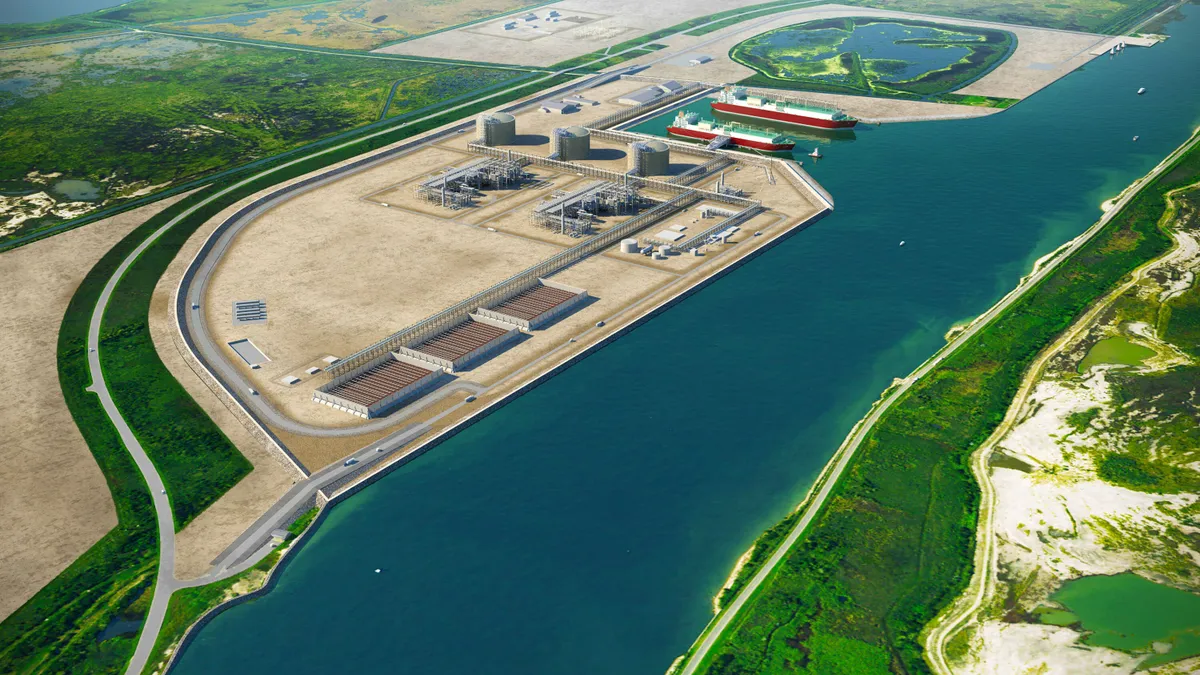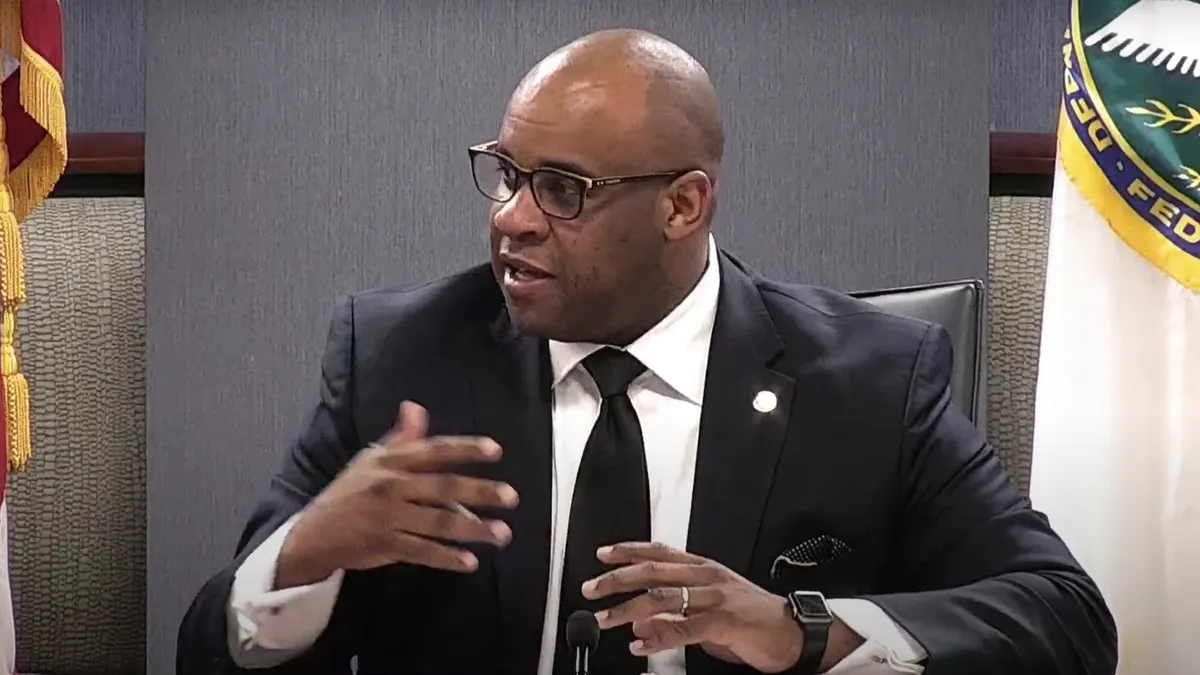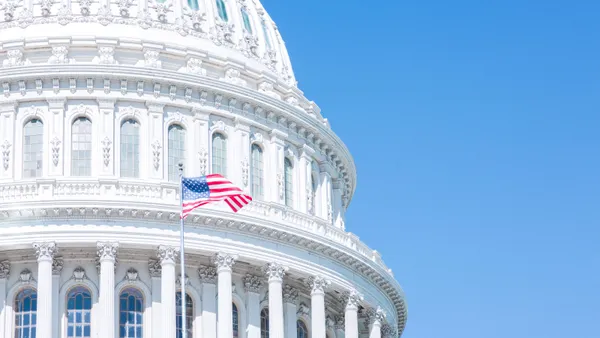Megan Gibson is a senior attorney with the Southern Environmental Law Center.
The Federal Energy Regulatory Commission is entrusted with a critical mandate: to regulate and approve energy infrastructure in a manner that serves the public interest, and protects consumers, our economy and the environment.
Yet, recent actions — or inactions — by FERC suggest a dereliction of this duty, particularly in its rubber stamping of dangerous liquefied natural gas export project facilities.
This disturbing trend is exemplified by FERC approving Venture Global’s Calcasieu Pass 2, or CP2, LNG export project, a massive gas export project in Cameron Parish, Louisiana. FERC’s approval of CP2 is particularly striking, given Venture Global’s ongoing pattern of regulatory violations and disregard for community welfare. FERC now has until Dec. 2 to revise and deny its authorization of this harmful and unneeded project.
To prevent further harm, FERC must stop greenlighting unnecessary and harmful LNG projects like CP2 LNG and reassert its obligation to actually serve as a regulator providing a meaningful restraint to unchecked fossil fuel expansion.
Exploiting loopholes and abusing contracts
Venture Global is a Virginia-based LNG company founded by two billionaire bankers with virtually no experience running an energy business. Their operations in Cameron Parish, Louisiana, epitomize FERC’s regulatory failures, showcasing how unchecked corporate practices can harm local communities, distort markets and undermine trust in our regulatory institutions.
Despite over two years of continuous production and more than 300 LNG shipments, Venture Global claims that Calcasieu Pass has not yet reached "commercial operation." Venture Global has avoided honoring long-term contracts with buyers, allowing it to sell LNG at inflated spot market prices. This approach has led to substantial financial windfalls — sometimes four times higher than competitors honoring their contracts.
Steve Hill, Shell's executive vice president, publicly criticized Venture Global's actions as "deceitful" and "damaging" to the industry during the Gastech conference in Singapore. He warned that if suppliers treat contracts as optional, buyers will lose trust and hesitate to engage in long-term agreements. This behavior threatens the foundational commitments that enable regulatory certainty, he said.
Some long-term customers, frustrated by Venture Global’s tactics, have sought intervention from FERC. However, FERC has allowed Venture Global to stall, withholding critical documents from its customers, delaying resolution, and permitting this corporate abuse to continue unchecked. FERC’s reluctance to enforce compliance with its regulations raises serious questions about its role as a regulator and protector of consumer and public interests.
Economic and environmental devastation for Cameron Parish
FERC has all but abandoned this once-thriving coastal community. The unchecked proliferation of LNG facilities in Louisiana has decimated the local economy, particularly for commercial fishermen.
In 2019, FERC approved a separate LNG export terminal along the Calcasieu Ship Channel — the CP1 LNG Facility — and a separate, new 23.4-mile gas pipeline, which will be adjacent to the proposed site of the CP2 facility. In addition to Venture Global’s facilities, FERC has approved Sempra Energy’s Cameron LNG, Sabine Pass LNG and several additional projects, which have created an industrial corridor that stretches across Cameron Parish. These operations disrupt crucial breeding grounds for shrimp and oysters, erode coastal resilience and threaten the safety of local fishing vessels. The fishing and shrimping industries that once defined Southwest Louisiana are now at risk of vanishing entirely.
For Cameron Parish residents like Anthony Theriot, FERC’s failure is personal. Theriot, a fisherman whose family has worked these waters for generations, has seen his shrimp catch drop by 68% since CP1 began operations. Theriot’s story is echoed by countless others in Cameron Parish, who now face the impossible choice of abandoning their heritage or continuing to bear the brunt of these industrial expansions.
FERC has also failed to hold Venture Global responsible for failing to comply with its air emission permits. Local residents have documented numerous unreported gas flaring incidents — flaring that, according to the facility’s environmental impact statement, should be an occasional event, not a regular occurrence.
Venture Global attributes these violations to design flaws, but rather than fixing the flawed design, the company has sought regulatory variances that would allow the increased pollution to continue indefinitely. Numerous Cameron residents have reported respiratory issues and chronic breathing problems because of the facility’s emissions. Desperate for relief, frontline community members petitioned the U.S. Environmental Protection Agency to investigate these ongoing abuses.
FERC’s mandate is to regulate facilities like CP1 to prevent precisely this type of abuse. Yet it continues to treat Venture Global as if it were a trustworthy partner, ignoring the very real harm to public health, the environment and the market.
LNG’s unchecked expansion
CP2’s approval, despite CP1’s well-documented environmental and contractual abuses, signals a troubling new low in FERC’s approach. Rather than scrutinizing Venture Global’s actions, FERC’s greenlighting of CP2 sends a message that these abuses are not just tolerated — they’re rewarded.
Now former Commissioner Allison Clements issued a compelling dissent, rightly concluding that “the CP2 LNG Project’s adverse environmental and socioeconomic impacts are so great that I am compelled to find that approving the project is inconsistent with the public interest.” Despite these major concerns, FERC’s majority opinion moved forward with the project approval, effectively dismissing these profound issues.
The unchecked expansion of LNG export facilities in Cameron Parish mirrors a troubling national trend. In just over a decade, the United States has surged from a minor LNG exporter to the largest in the world, now boasting over 14 billion cubic feet per day in export capacity. As of February 2024 — just before the Department of Energy temporarily paused LNG export approvals to non-Free Trade Agreement, or non-FTA, countries — DOE had already authorized exports of 48 billion cubic feet per day, an amount exceeding 45% of current domestic production.
But as the LNG industry has accelerated, FERC has failed to match its regulatory responsibilities to this rapid expansion. Rather than scrutinizing market need or thoroughly assessing the cumulative environmental impacts required under the National Environmental Policy Act, FERC has pressed forward, approving project after project without regard for the mounting costs to local communities.
FERC’s decisions to approve LNG export facilities also have significant implications for the national economy, the domestic power sector and broader energy policy. By approving every facility before it and diverting significant gas capacity to foreign markets, FERC is driving up costs for American families, businesses and the energy sector. This not only fails to ensure these decisions serve the public interest as required under the Natural Gas Act but also poses a serious threat to the economic and overall well-being of the nation.
LNG exports provide cheaper energy resources to foreign manufacturers, giving these competitors an advantage and undermining the competitiveness of American manufacturing in a global marketplace. Simultaneously, by prioritizing exports, FERC is constraining domestic gas supply, risking deepening economic inequities, and exacerbating price volatility.
By approving LNG exports and further entrenching fossil fuel reliance — all without rigorously evaluating their domestic economic impacts — FERC is compounding inequities and undermining efforts working toward the urgently needed expansion of a clean, more reliable, affordable and modern energy grid.
These decisions risk locking the nation into a misguided export strategy that benefits foreign economies at the expense of American consumers and manufacturers for decades to come. It is imperative that FERC reevaluate its approach to LNG export approvals, aligning its policies with the broader public interest and the economic and energy security of the United States.
Even DOE has recognized the need for a pause, temporarily suspending its review of new LNG export applications this year to reevaluate the economic and environmental impact of this expansion. And there is additional hope that DOE will do the responsible and sensible thing and 1) release its urgently needed updated public interest analysis as soon as possible, and 2) deny Venture Global’s pending request to export to non-FTA countries. Meanwhile, FERC remains undeterred, treating Southwest Louisiana as a sacrifice zone.
It’s time for FERC to act decisively: stop greenlighting LNG projects without proper scrutiny, reestablish its commitment to accountability and safeguard our economy, communities and fragile ecosystems from the consequences of unchecked industrial expansion. The stakes couldn’t be higher — and the public deserves better.






















